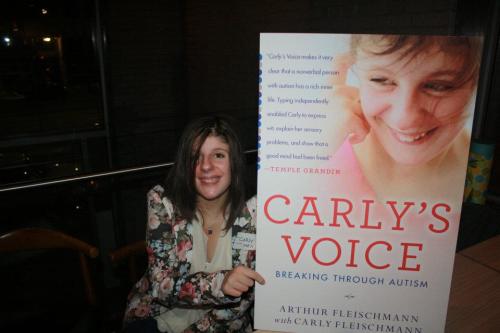I have recently come across a blog written by a 12 year old Autistic boy. This blog does a great job showing the honest thoughts and reflections of a boy experiencing everyday life.
Check out his blog here: http://autisticandproud.wordpress.com/

I have recently come across a blog written by a 12 year old Autistic boy. This blog does a great job showing the honest thoughts and reflections of a boy experiencing everyday life.
Check out his blog here: http://autisticandproud.wordpress.com/
“We all have a inner voice, we just need to find away to get it out.”-Carly Fleischmann

Watch the video below to see Carly Fleischmann, a girl who could once not communicate, type her thoughts and emotions, and surprise the world with her ability to share her voice. Carly is an inspiration to non-verbal autistic people and to those who thought that people labeled as non-verbal autistic would always be silent.
I am currently starting to read the book “Carly’s Voice” by Arthur Fleischmann and Carly Flesichmann. Carly, a teenager diagnosed with non-verbal autism, reveals her inner voice to the world by typing her thoughts on a keyboard.
In earlier posts, I have recommended this book since I have heard such great reviews. I personally respect Carly and have been inspired by her story. I am excited to actually read through her book and to share my thoughts over the next couple of weeks of what I learn.
Carly is the reason why I want to eventually study the language development of non-verbal autistic children. I believe that every child has an inner voice waiting to be unlocked by those willing to be both patient and hopeful. I think we should have high expectations for every child and not lose hope in a person’s ability to communicate. Although communication will look different for all people, we must find a way to decode the messages a child is sending. I question if we should simply overlook hand flapping or stimming as “random”—but view these body movements of a possible way of communication. Gestures, as well as facial expressions, body movement and posture, eye contact, and touch are all types of nonverbal communication. In students who are autistic, I would like society to take notice of the various gestures autistic students make.
Non-verbal body language makes up the majority of a human’s actual communication. In recent studies, I have been surprised to see why more research has not been done studying the body movements of autistic children more closely. Can we possibly find a correlation between the number of hand flaps per minute or the length of a child’s stimming to the way the mind of an autistic child’s brain works?
As I hope must of us believe, the brain of an autistic child is not silent. There is thought, there is feeling, and there is a voice inside that person waiting to be revealed to the world. Our job is to help those children to use their “voice” in a way we both understand.
My hope for 2013 and the years after is for society to look for ways to make more voices be heard. I would love to hear other testimonies such as Carly’s story and find a way to help many children trapped in their own bodies.
“Art can permeate the very deepest part of us, where no words exist.” -Eileen Miller, The Girl Who Spoke with Pictures: Autism Through Art

![]() Photo Credit: Toni Verdú Carbó via Compfight
Photo Credit: Toni Verdú Carbó via Compfight
Katy Perry and 11 year old Jodi DiPiazza sang a duet together on October 18th as part of an autism awareness event. Perry is one of DiPiazza’s favorite artists and had the privilege of singing “Firework” on stage with the beloved star. DiPiazza was on the piano and sang with Perry on the side. The two shared an emotional hug after the song was over.
The next day, Perry tweeted, “I will never forget last night. It was the most important moment thus far of what I do.”
Singing on stage was a huge accomplishment for DiPiazza. DiPiazza says, “At 3, I struggledwith speaking but I could sing… and I did constantly. Again, it became apparent that I had perfect pitch. I was fortunate to be admitted to the best school for autism in the entire world …. I still struggle every day with all the deficits and difficulties that autism brings. It’s a full time job. I love making music and I hope that my music makes you feel as happy as music makes me.”
Her father commented and shared “We are extremely lucky to have gotten into a program where my child was able to access exactly what she needed,” the progress DiPiazza has made is incredible.
A video of the performance is shared below. Enjoy!!
Katy Perry singing with 11 year old autistic girl, Jodi DiPiazza
Hundreds from Israel and abroad convened in Jerusalem for ICare4Autism’s International Autism Conference. Below I included a short video as well as the news article covering the event.
Please watch this three minute video interviewing the founder of ICare4Autism. “We cannot give up on our children, especially children with autism. Everyone has a place in this world and they can function if you put in the effort. I like to use a four letter word, love…” http://youtu.be/6-W6GjIyPfk
Below is the article Yoni Kempinski wrote for www.israelnationalnews.com about the global event.
“The 2012 International Autism Conference concluded Thursday in Jerusalem with organizers laying out a detailed plan for ICare4Autism to lead the global movement to help those on the autism spectrum. After two days of intense panels and plenary sessions that included a thousand participants from over twenty different countries, ICare4Autism announced that it will focus on three key areas over the next twelve months:
“We will continue to work tirelessly to realize our dream of ICare4Autism’s new global headquarters on Mt. Scopus in Jerusalem, we will move quickly to implement a state-of-the art database system to allow families and caregivers to check information from various governmental and NGO offices in one place, and finally, we will work to implement a workforce initiative for training young adults on the autism spectrum and placing them in high-quality jobs,” said Dr. Joshua Weinstein, founder CEO of ICare4Autism.
Mayor Nir Barkat greeted the conference participants, presenting a detailed vision for Jerusalem in the years to come. “With strong research and care, we have the ability to send a message all over the world,” said the Mayor.
“Jerusalem is a powerhouse in health life sciences, and 50% of Israel’s clinical trials are conducted here. There is no doubt in my mind that ICare4Autism will be extremely successful in Jerusalem. We will make ICare4Autism a centerpiece for this city,” the mayor concluded.
Barkat’s greetings were followed by speeches from Dame Stephanie Shirley, the founding UK Ambassador for Philanthropy, Dr. Shekhar Saxena of the World Health Organization, and First Lady Marta Linares de Martinelli of Panama.
“As the keynote speaker at the conference, I was extremely impressed with the depth and diversity presented,” said Dame Shirley. She shared her own personal experiences with the participants, explaining how her family’s struggles in raising their autistic son encouraged her to become active in the global cause of autism spectrum disorder policy and awareness.
Dr. Saxena noted that “The key is collaboration: for NGOs, developmental organizations and social activists to work together to make a difference for affected families.”
“Jerusalem is the natural location for an event of this nature because the country has historically been a leader in groundbreaking neurological research. We saw it as imperative to expose some of the world’s top academics and public health advocates in this quickly developing field to the Israeli marketplace of ideas,” Dr. Weinstein explained. “We furthermore firmly believe that collaborations like these will lead to the breakthroughs necessary to best confront this condition and we are confident that ICare4Autism will be the catalyst in this global process.”
Over the two-day event, participants chose from fours tracks that focused on important disciplines relating to autism; “Policy and Awareness,” “Bio-Medical Research and Practice,” “Education and Behavioral Techniques,” and “Technology and Resources.” Each track featured top international experts in the designated field.
Some of Israel’s leading institutions of higher learning partnered with ICare4Autism in sponsoring the conference. These included Hebrew University, The Weizmann Institute, Tel Aviv University, Haifa University and Bar Ilan University. The Ministries of Health and Education also collaborated with ICare4Autism on the content of the conference.
Dr. Eric Hollander, a renowned psychiatrist at the Albert Einstein Medical Center in New York and the Chairman of the ICare4Autism Advisory Council, added that he sses the ICare4Autism 2012 Global Conference as “a unique opportunity for leading researchers, clinicians, educators and policymakers from all over the world to share their latest findings and create powerful new international collaborations that will ultimately allow us to discover the etiology of autism and its biologic and environmental causes. This global cross-disciplinary gathering will play a vital role in speeding the development of improved methods of autism detection and treatment that are urgently needed by patients and the families.”
A quick word from John Elder Robinson:
“…. our brains continue to develop throughout our lives. This is completely counter to what I’ve often heard but never accepted: “If you’re autistic, you never change.” If I am any example, it is possible to teach old dogs new tricks. In fact, my entire life exemplified continuing change”.
“As a kid, I was voted “most likely to fail,” and indeed, I flunked out of high school. Yet only a few years later I became an engineer on one of the biggest rock ‘n’ roll tours in the world. Then I helped design some of the first electronic games. When I was in my thirties, I made a complete change of direction, raising akid and starting an automobile business. And at fifty, I changed course once again, becoming a successful author.”
Passage taken from: Robison, John Elder. Look Me in the Eye: My Life with Asperger’s. New York: Crown, 2007. Pg 284.
As stated in previous posts, I highly recommend the book: “Look Me in the Eye” by John Elder Robinson to gain a better understanding on people with Asperger’s.
“If I could snap my fingers and be nonautistic, I would not. Autism is part of what I am.” -Temple Grandin

![]() Photo Credit: Jacki Gallagher via Compfight
Photo Credit: Jacki Gallagher via Compfight
“You have got to keep autistic children engaged with the world. You cannot let them tune out.” -Temple Grandin

Photo Credit: Vince Alongi via Compfight